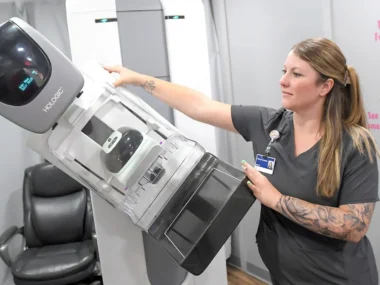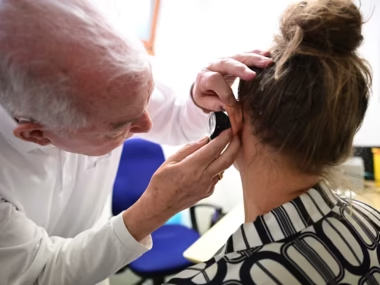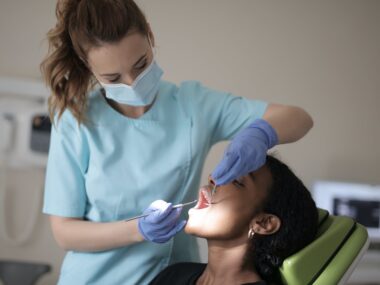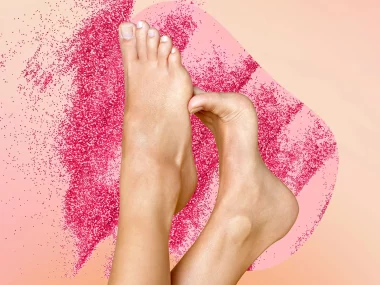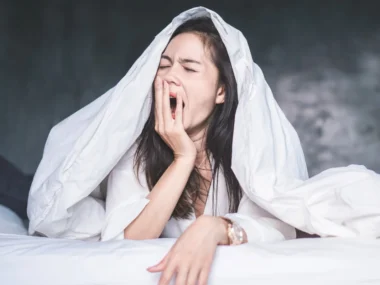Although other medical conditions can cause hot flashes, they are most often due to menopause, a time when menstrual periods become irregular and eventually stop. In fact, hot flashes are the most common symptom of menopause.
Symptoms of hot flashes
During a heat flash, you may experience:
- A sudden feeling of warmth spreads across your chest, neck, and face.
- Glowing appearance accompanied by skin redness.
- Rapid heartbeat.
- Sweat, mostly on the upper body.
- Feeling shivering when the hot flash subsides.
- Feelings of anxiety.
The frequency and severity of hot flashes varies among women. One seizure may last a minute or two, or up to 5 minutes.
Hot flashes may be mild or very severe; To the point that it can hinder a woman from performing her daily activities, and it can occur at any time of the day or night. Nocturnal hot flashes (night sweats) may wake you up from sleep, and can cause long-term sleep disturbances.
How often hot flashes occur varies between women, but most women who report hot flashes experience them daily. On average, hot flash symptoms last for more than seven years, and in some women they may last for more than 10 years.
If heat flashes affect your daily activities or nighttime sleep, consider seeing your doctor to discuss treatment options.
Causes of hot flashes
Hot flashes are most commonly caused by changing hormone levels before, during, and after menopause. It is not clear exactly how hormonal changes cause hot flashes, but most research suggests that hot flashes occur when low estrogen levels cause the body’s thermostat to become more sensitive ( hypothalamus) for subtle changes in body temperature. When the hypothalamus thinks your body is too warm, it initiates a series of processes, hot flashes, to cool you down.
Hot flashes and night sweats rarely occur; Due to something other than menopause. Other possible causes include medication side effects, thyroid problems, certain types of cancer and side effects of cancer treatment.
Risk factors for hot flashes
Not all menopausal women experience hot flashes, and it’s not clear why they occur in some women. Factors that may increase your risk include:
Smoking : Women who smoke are more susceptible to heat flashes.
Obesity : A high body mass index (BMI) is associated with a higher frequency of heat flashes.
Race . Black women report hot flashes during menopause more than women of other races. Hot flashes are reported less frequently in Asian women.
Complications of hot flashes
Hot flashes may affect your daily activities and quality of life. Nocturnal hot flashes (night sweats) may wake you from sleep and, over time, can cause long-term sleep disturbances.
Research suggests that women who experience hot flashes may have an increased risk of heart disease and greater bone loss than women who do not experience hot flashes.
Treating hot flashes
The most effective way to relieve the discomfort of hot flashes is to take estrogen , but taking this hormone comes with some risks. If estrogen is right for you and you start using it within 10 years of your last menstrual period or before age 60, the benefits may outweigh the risks.
Medications such as antidepressants and anti-seizure medications may also help reduce hot flashes, although they are less effective than hormones.
Discuss the pros and cons of various treatment methods with your doctor. If hot flashes do not affect the course of your life, you may not need treatment, as hot flashes gradually disappear in most women even without treatment, but it may take several years for them to stop.
Estrogen is the primary hormone used to reduce hot flashes. Most women who have had a hysterectomy can take estrogen alone, but if you didn’t have your uterus removed, you must take progesterone with estrogen to prevent endometrial cancer.
With either regimen, treatment should be tailored to your needs, and the guidelines suggest using the smallest effective dose to control symptoms. The duration of treatment also depends on striking a balance between the risks and benefits of hormonal treatment. The goal is to improve your quality of life.
Some women who take progesterone-estrogen combination therapy experience progesterone-related side effects, and for women who cannot tolerate oral progesterone.
As with progesterone, taking bazedoxifene with estrogen may help you avoid the increased risk of endometrial cancer caused by taking estrogen alone. Bazedoxifene may also help protect your bones.
If you have or are at risk of breast or endometrial cancer, heart disease, stroke or blood clots, talk to your doctor about whether estrogen therapy is right for you.
The low-dose form of paroxetine (Brisdelle) is the only nonhormonal treatment approved by the US Food and Drug Administration for the treatment of hot flashes. Other antidepressants that have been used to treat hot flashes include:
- Venlafaxine (Effexor XR)
- Paroxetine (Paxil, Pexeva)
- Citalopram (Celexa)
- Escitalopram (Lexapro)
Although these medications are not as effective as hormone therapy for severe hot flashes, they may be helpful for women who cannot use hormones. Possible side effects include nausea, dizziness, weight gain, dry mouth, or sexual dysfunction.
Other medications that may provide relief for some women include:
Gabapentin (Neurontin, Gralize, others)
Gabapentin is an anti-seizure medication that is moderately effective in reducing hot flashes. Side effects may include drowsiness, dizziness, water retention in the extremities (edema), and fatigue.
Pregabalin (Lyrica)
Pregabalin is another anti-seizure medication that can be effective in reducing hot flashes. Side effects may include dizziness, drowsiness, difficulty concentrating, and weight gain.
Oxybutynin (Ditropan XL, Oxytrol)
Oxybutynin comes in the form of pills or skin patches, and is often used to treat urinary conditions such as overactive bladder. It may also help relieve hot flashes in some women. Side effects may include dry mouth, dry eyes, constipation, nausea, and dizziness.
Clonidine (Catapress, Capvay, others)
Clonidine comes in the form of pills or skin patches, and is often used to treat high blood pressure and may provide some relief from hot flashes. Side effects may include dizziness, drowsiness, dry mouth, and constipation.
Veozah
Veozah is used to treat hot flashes associated with menopause. It does not contain any hormones. It works by blocking one of the brain pathways that helps regulate body temperature. The dose is taken orally in the form of one pill daily. Side effects include abdominal pain, diarrhea, difficulty sleeping, back pain, hot flashes, and elevated liver enzymes. People with liver disease should not take this medicine.
A procedure known as stellate ganglion block has shown some benefit for treating moderate to severe hot flashes, but more research is needed. It involves injecting an anesthetic into a nerve group in the neck. The treatment was used to control pain. Side effects include pain and bruising at the injection site.
Tips for dealing with menopause
If your hot flashes are mild, you can try to control them by making these lifestyle changes:
Keep your body cool
A small increase in core body temperature can cause heat flashes. So wear multi-layered clothes so that you can remove some clothes when you feel your body temperature rising.
Open the windows or use a fan or air conditioner
Reduce the room temperature if possible. If you feel a hot flash is coming, have a cold drink.
Pay attention to what you eat and drink
Hot and spicy foods, caffeinated drinks, and alcohol can cause hot flashes. Discover the causes of the condition and avoid them.
Do mental exercises that enhance body health
Some women with mild hot flashes find relief from mental health-improving exercises, but there is no conclusive evidence that this is effective. Examples include meditation, slow and deep breathing, stress management, and guided imagery. If these methods don’t ultimately calm hot flashes, they may provide other benefits, such as relieving sleep disturbances that often occur with menopause.
Quit smoking
Smoking is associated with an increase in hot flashes. By refraining from smoking, you may reduce hot flashes and reduce your risk of many serious health conditions such as heart disease, stroke and cancer.
Try to lose weight
If you’re overweight or obese, losing weight can help relieve hot flashes.









